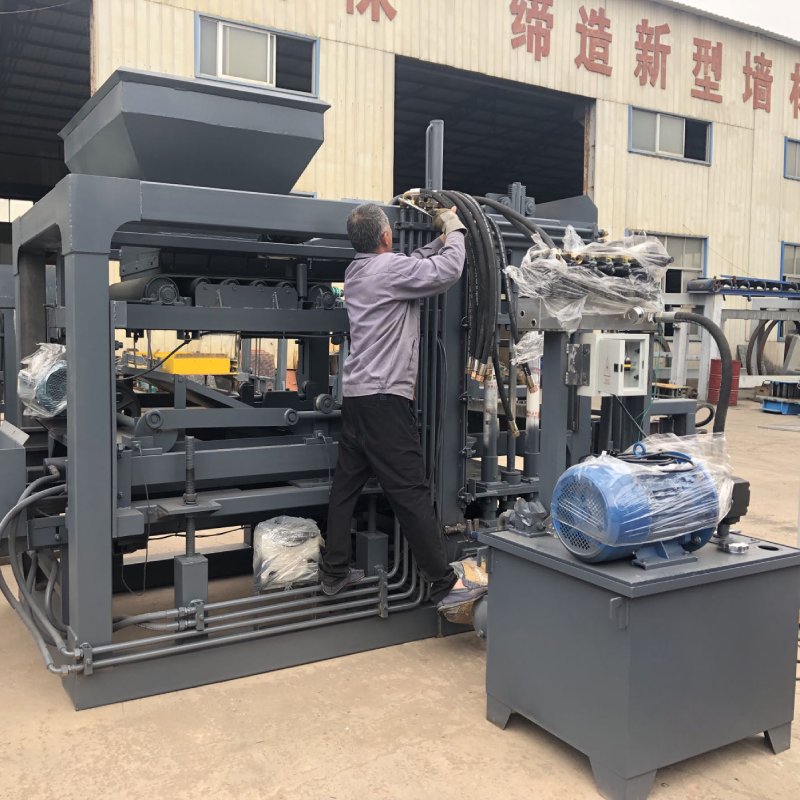
Image source Aiwei block machine
Block Machine Manufacturers Redefining Construction
Introduction
The construction industry has undergone significant transformation over the years, driven by technological advancements and a growing emphasis on sustainability. One of the pivotal players in this evolution is the block machine manufacturing sector. Block machines, also known as concrete block making machines, play a crucial role in the construction process by producing concrete blocks used for various applications, including building walls, pavements, and more. In this article, we will delve into how block machine manufacturers are redefining the construction landscape through innovations that enhance efficiency, sustainability, and overall project quality.
1. Technological Advancements Shaping the Industry
Block machine manufacturers are at the forefront of integrating cutting-edge technologies into their products. The incorporation of automation, robotics, and computerized controls has revolutionized the block manufacturing process. Traditional manual labor-intensive methods have given way to streamlined, high-speed production lines capable of producing consistent and precise concrete blocks.
1.1. Automation and Robotics
Automation has significantly improved the efficiency of block production. Modern block machines are equipped with automated systems that handle various stages of production, from mixing raw materials to molding, curing, and stacking finished blocks. This not only accelerates the production process but also reduces the likelihood of human errors, leading to more reliable and consistent block quality.
Robotic systems are being integrated into block manufacturing setups to handle tasks that require precision and speed. Robotic arms can efficiently handle the placement of reinforcement bars, apply mortar, and even perform complex block designs, creating opportunities for intricate architectural features.
1.2. Computerized Controls and IoT Integration
Computerized controls play a pivotal role in optimizing block production. Manufacturers are incorporating sophisticated control systems that monitor and adjust parameters such as vibration frequency, pressure, and curing conditions in real-time. These controls ensure that each block meets the desired quality standards, resulting in uniform strength and durability.
The integration of the Internet of Things (IoT) further enhances block machine operation. Sensors embedded in machines collect data on various aspects of production, allowing manufacturers to track performance, identify potential maintenance issues, and make data-driven decisions for process improvement.
2. Sustainable Practices: From Materials to Production
The construction industry’s environmental impact has led to a growing emphasis on sustainable practices. Block machine manufacturers are responding by developing eco-friendly solutions that minimize resource consumption and waste.
2.1. Recycled and Green Materials
Many manufacturers are exploring the use of recycled materials in block production. Incorporating recycled aggregates, fly ash, and other industrial byproducts into concrete mixes not only reduces waste but also conserves natural resources. These blocks often exhibit comparable or even enhanced performance characteristics, making them a viable sustainable alternative.
Green materials, such as geopolymers, are gaining traction in block production. Geopolymers utilize less energy and produce fewer carbon emissions compared to traditional cement-based materials. By offering alternatives to traditional concrete, block machine manufacturers contribute to lowering the construction industry’s carbon footprint.
2.2. Energy Efficiency
Energy-efficient block manufacturing processes are becoming more prevalent. Manufacturers are employing energy-efficient technologies, such as improved curing methods, optimized vibration systems, and enhanced insulation in curing chambers. These innovations not only reduce energy consumption but also shorten curing times, increasing overall production efficiency.
3. Customization and Design Flexibility
Block machine manufacturers are enabling architects and designers to push the boundaries of creativity by offering enhanced customization and design flexibility.
3.1. Advanced Molding Techniques
Incorporating advanced molding techniques, such as 3D printing molds and precision engraving, allows for the creation of intricate and unique block designs. Architects can now incorporate intricate patterns, textures, and even logos directly into the blocks, adding aesthetic value to structures.
3.2. Varied Block Shapes and Sizes
Traditional rectangular blocks are giving way to an array of shapes and sizes. Block machines are designed to produce blocks of different dimensions, enabling architects to explore unconventional designs. Curved, interlocking, and modular blocks provide opportunities for innovative and visually appealing architectural elements.
4. Global Impact and Future Trends
The impact of block machine manufacturers extends beyond individual projects; it shapes the global construction industry and trends that will define its future.
4.1. Affordable Housing Solutions
Block machine manufacturers play a vital role in addressing global housing challenges. By producing cost-effective and durable building blocks, they contribute to the development of affordable housing solutions, particularly in regions with limited resources.
4.2. Urbanization and Vertical Construction
As urbanization continues, the demand for vertical construction rises. Block machines are adapting to this trend by producing blocks suited for vertical structures. Manufacturers are optimizing block designs for enhanced load-bearing capacity, fire resistance, and thermal insulation, ensuring the safety and comfort of urban dwellers.
4.3. Integration of Artificial Intelligence
Looking ahead, the integration of artificial intelligence (AI) holds immense potential for block machine manufacturers. AI-driven systems could optimize production schedules, predict maintenance needs, and further refine block quality through real-time analysis of production data.
Conclusion
Block machine manufacturers are reshaping the construction industry by embracing technological innovation, sustainability, and design flexibility. Their contributions extend beyond mere production, influencing project efficiency, environmental responsibility, and architectural creativity. As the construction industry continues to evolve, these manufacturers will remain key players in driving progress, ensuring that the buildings and infrastructure of tomorrow are built upon a foundation of innovation and sustainability.
